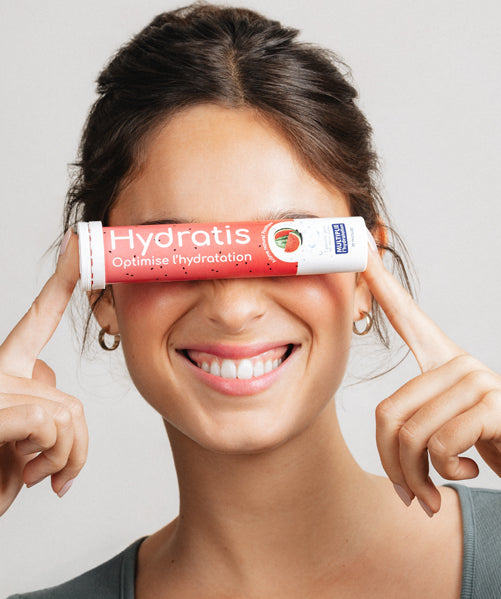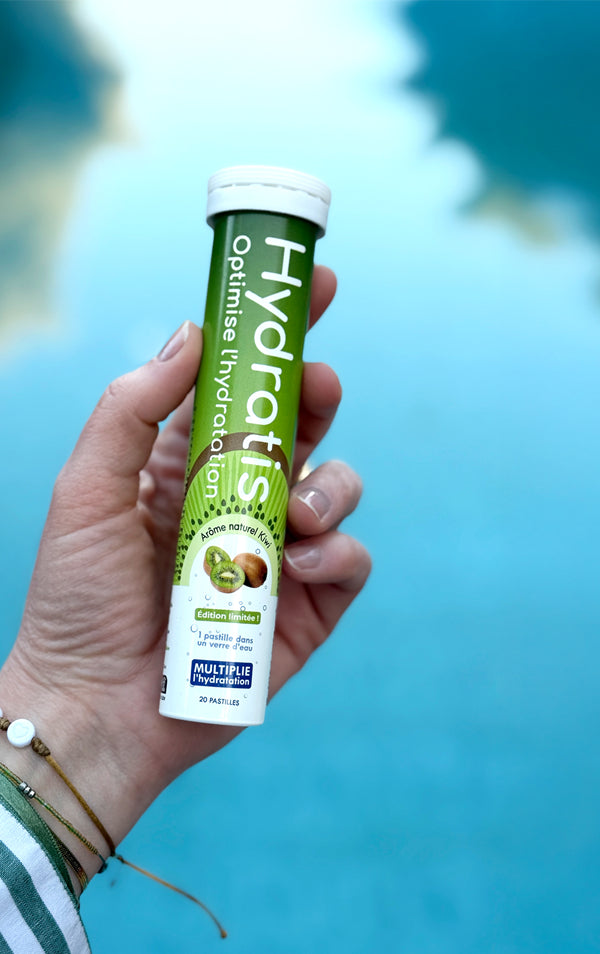Water, a vital element of the human body
Water is essential for the proper functioning of your body : from maintaining body temperature to eliminating toxins. It represents approximately 60% of body weight in adults and up to 75% in infants . It plays a key role in digestion, blood circulation, regulating body temperature, and eliminating waste. Even a moderate lack of water intake can quickly impair your physical and mental performance.
Body water is distributed in two main compartments:
- Intracellular water : is contained within cells, it participates in metabolic reactions and in maintaining cell volume.
- Extracellular water : includes blood plasma (20 to 25%), interstitial fluid (75 to 80%), lymph, and cerebrospinal fluid (present in the tissue surrounding the brain). It is essential for the transport of nutrients and waste products, and for cell communication.
The body maintains its fluid balance through a delicate coordination between the brain (hypothalamus), hormones, and kidneys. Uncompensated fluid loss can lead to fatigue, headaches, or decreased concentration.
The major roles of water in our body
Body temperature regulation (thermoregulation)
Water actively contributes to regulating your body temperature. During exercise or in hot weather, the evaporation of sweat helps to dissipate excess heat. Blood, rich in water, carries this heat from the organs to the skin, where it is released. Your blood vessels dilate to facilitate this dissipation, or constrict to limit it in cold weather. If your fluid intake is insufficient, these mechanisms become less effective!
Maintaining blood volume and blood pressure
Water is essential for maintaining stable blood volume and sufficient blood pressure, ensuring optimal heart and blood vessel function. Your blood, composed largely of water, transports nutrients, oxygen, and hormones. When water levels decrease, the blood thickens, slowing circulation. This can cause a drop in blood pressure, dizziness, or faintness .
Kidney function and waste elimination
Your kidneys constantly filter your blood to remove metabolic waste products, such as urea and excess salts . This process depends on sufficient daily water intake . Water dilutes these waste products so they can be effectively eliminated through urine. If you don't drink enough, your urine becomes more concentrated, which can disrupt proper kidney function. In the long term, this increases the risk of developing kidney stones.
Saliva production and digestion
Your saliva, which is 99% water, plays a vital role in digestion. It moistens food, facilitates chewing and swallowing, and aids in the breakdown of sugars. Regular water intake is therefore essential from the earliest stages of the digestive process. Dehydration reduces saliva production, which can disrupt swallowing and lead to a dry mouth.
Skin beauty and elasticity
Water is a key component of your skin barrier . Its water content varies depending on external aggressors and natural evaporation. Well-hydrated skin is more supple, smooth, and radiant. Water ensures tissue elasticity . Conversely, a lack of water dulls the complexion and accentuates fine lines. Drinking enough water is a simple but fundamental step for healthy skin.
Joint lubrication and organ protection
Water is an essential component of synovial fluid, which lubricates your joints by reducing friction between bones. It also plays a role in absorbing shocks during everyday movements. Optimal water intake is therefore crucial for maintaining joint mobility and comfort . Water also contributes to the protection of vital structures such as the brain, heart, and liver.
What happens if you don't drink enough water?
If you don't drink enough water, your body can no longer compensate for losses through urine, perspiration, and respiration. Even mild dehydration can lead to symptoms such as fatigue , headaches , or decreased concentration. Signs may include dark urine , a dry mouth, and dizziness . In the long term, dehydration can increase the risk of kidney stones and urinary tract infections.
What if we drink too much water?

Drinking too much water can lead to hyponatremia, which is a low concentration of sodium in the blood. You may also experience symptoms such as nausea, headaches, or confusion. However, this is rare and mainly occurs with rapid and significant water intake.
How much water should you drink per day?
EFSA recommends that children over 14, adults, and the elderly drink between 1.5 and 2 liters of water per day. Infants and children have specific needs, adapted to their age and weight. These reference values for total water intake include water from drinking water, beverages of all kinds, and the moisture content of food.
|
Age |
Daily quantity |
|
0-6 months |
100-190 ml/kg of child's body mass |
|
6-12 months |
800-1000 ml |
|
12-24 months |
1100-1200 ml |
|
2-3 years |
1300 ml |
|
4-8 years old |
1600 ml |
|
9-13 years old |
2100 ml for boys 1900 ml for girls |
|
Ages 14 and over, adults and senior citizens |
2500 ml for boys/men 2000 ml for girls/women |
However, it's important to adjust your fluid intake according to physical activity, ambient temperature, and diet. Urine color is a good indicator of fluid consumption : clear urine signifies good hydration. Remember to also consider the water content of food, especially fruits and vegetables.
When and how should you drink water?
The best times to stay hydrated
It's important to drink regularly throughout the day, especially at key times: upon waking, before meals, and during physical activity . Don't wait until you feel thirsty to drink; this sensation only appears when the body is already dehydrated. Adopting these simple habits helps maintain your concentration and well-being.
Practical advice
To maintain good hydration levels, drink small sips throughout the day , rather than large amounts all at once. Always carry a reusable water bottle with you to remind you to drink. Consider naturally flavoring your water by adding a few slices of lemon, mint leaves, or berries.
In summary: water, the source of life and health
Water is essential for many metabolic functions. It plays a key role in temperature regulation, digestion, and waste elimination. Drinking regularly, even when you're not thirsty, is a simple yet fundamental step for good health. By making this a daily habit, you can support your energy, concentration, and overall well-being.
FAQ
What is the role of water in the body?
Water is essential to ensure the metabolic functions of the human body: thermoregulation, transport and excretion of waste, digestion, as well as the protection of joints and organs, in particular.
How much water should you drink each day?
Approximately 1.5 to 2 liters per day for adults, adjusted according to activity level, temperature, and diet. Intake should be adjusted for infants and children under 14 years of age.
Is it possible to drink too much water?
Yes, it is possible to drink too much water, but this is rare.
What happens if I don't drink enough?
Even a slight lack of water can cause fatigue, headaches, and decreased concentration.
Does water help to have beautiful skin?
Yes, water contributes to better hydration of the skin barrier, making it smoother and brighter.
Do I have to wait until I'm thirsty to drink?
No, thirst is a late signal: it is better to drink regularly throughout the day.
Is tap water as good as bottled water?
Yes, in France it is controlled and safe, unless otherwise indicated locally.
Bibliography
EFSA Panel on Dietetic Products, Nutrition and Allergies (NDA). (2010). Scientific Opinion on Dietary Reference Values for Water . EFSA Journal, 8(3), 1459. https://doi.org/10.2903/j.efsa.2010.1459
Hausswirth, C., & Rousseau, V. (2013). Chapter 7. Hydration. In C. Hausswirth (ed.), Improving your recovery in sport (1–). INSEP-Éditions. https://doi.org/10.4000/books.insep.1347
Sawka, MN, Cheuvront, SN, and Kenefick, RW. Hypohydration and human performance: Impact of environment and physiological mechanisms. Sports Med 45 (Suppl. 1), 51–60 (2015). https://doi.org/10.1007/s40279-015-0395-7






